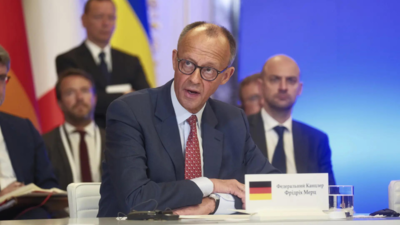
New Chancellor Friedrich Merz faces a plethora of challenges (Image: AP)
What do the previous centre-left coalition government of Social Democrats (SPD), environmentalist Greens and the neoliberal Free Democrats (FDP) and the new alliance of the centre-right Christian Democrats (CDU), Bavaria's Christian Social Union (CSU), and the SPD have in common? Apart from the fact that both of them took around 10 weeks to form a coalition agreement, not much.
At least, that's what the conservative parties maintain."The change in direction that many of the population want is set down on paper," said CSU leader Markus Söder at the signing of the coalition agreement in early May. "Strengthening the economy, limiting illegal migration, putting Germany back in order, and giving it new momentum." And he added, this must now be done "at top speed."Among the Social Democrats, however, there is little inclination to fundamentally change everything that they had put in place over the past three and a half years in power.
They are resisting overly drastic cuts, especially in social policy.The chancellery is now back in the hands of the CDU. Its leader, Friedrich Merz, has become the head of government, while SPD leader Lars Klingbeil is his vice chancellor and finance minister. In total, there are 17 ministries. The CDU and SPD each lead seven, the CSU three. What is striking is that the CDU has mainly sent lawyers into the race, while the SPD has appointed far more women than men.
The CDU/CSU and SPD are an alliance of convenience, forged because the results of the February 23 election yielded no other way to form a majority that did not include the far-right Alternative for Germany (AfD). However, Chancellor Merz has emphasized that the two parties had grown closer during the coalition negotiations."Over time, we found ourselves working more and more closely, in an increasingly collegial and trusting manner.
I am very confident that we will succeed in governing our country with strength, foresight, and trust," he said.
More border controls and refusals:
The CDU/CSU and SPD see it as their responsibility to prevent the AfD from growing in strength. Interior Minister Alexander Dobrindt (CSU) said on public broadcaster ARD that this primarily means dealing with the issues that have "made the AfD big," adding that there is "work to be done." The AfD must be "governed away."Germany will now turn some asylum-seekers away at its borders, Dobrindt said on May 7. He added that exceptions would be made for "vulnerable groups," including pregnant women and children.Several thousand additional officers are to be deployed to monitor the borders, in addition to the roughly 11,000 federal police officers already on the ground. Increased air surveillance aims to make it easier to identify smugglers and to be able to react more quickly to changes in their routes.Several of Germany's 16 federal states support the plans. These include Brandenburg, Saxony and Bavaria, which have borders with Poland, the Czech Republic and Austria respectively. However, there was immediate criticism from the neighboring countries. "We are not going to close the borders, but we are going to control the borders more strictly and this stronger control of the borders will also lead to a higher number of rejections," said Dobrindt. But he also sought to allay concerns. "We will gradually increase this higher number of rejections and the stronger controls at the borders," he added. "We will ensure that, step by step, more police forces are deployed at the borders and can also carry out these pushbacks."
Germany has no federal budget:
In terms of domestic policy, Finance Minister Lars Klingbeil has had to get to work immediately. It's his job to present a federal budget as quickly as possible for the current year.
The previous government fell apart trying to achieve just this back in November. Even a draft for the 2026 budget is already overdue.The CDU/CSU and SPD have made governing a little easier for themselves with a €500 billion ($567) special fund for investments. Now, as Klingbeil put it, "the biggest modernization in decades" is being launched. "For schools, for the railways, for security, for fast internet, for climate protection, for energy, for mobility, for additional housing."
Too many pensioners, too few skilled workers:
Nevertheless, the government will still have to make hefty cuts. The additional debt may only be used for investment and not for social spending. But this is precisely what continues to grow due to the demographic shift in Germany.Germans are getting older and living longer. A reform of the pension system is urgently needed, but the SPD has insisted on keeping pensions stable. Currently, every fourth euro from the federal budget is paid into the pension funds as a subsidy.
The older the population gets, the greater the costs for care and health insurance. Here, too, Klingbeil will have to consider how costs can be reduced.A lot will depend on how the German economy develops, especially when it comes to financing social spending. And the outlook is bleak, with the country in its third year of recession. Klingbeil has stressed that strengthening the economy is the highest priority."Prosperity has to be earned, and that is why this coalition agreement is a clear sign that we want to strengthen industry, attract future industries to Germany, and that we are committed to Made in Germany."
Merz faces foreign policy challenges:
The new government also faces enormous challenges in foreign policy. Following US President Donald Trump's policy shift and in view of the threat from Russia, Germany must redefine its role in Europe and the world.This is what Merz, a seasoned European politician and transatlanticist, wants to take on as his central task. "Large parts of Europe, the European Union in particular, are waiting for us to once again make a powerful contribution to the success of the European project," he said. The new chancellor plans to set up a National Security Council in the chancellery to bundle foreign policy and security policy decisions going forward.

 20 hours ago
41
20 hours ago
41




























 English (US)
English (US)